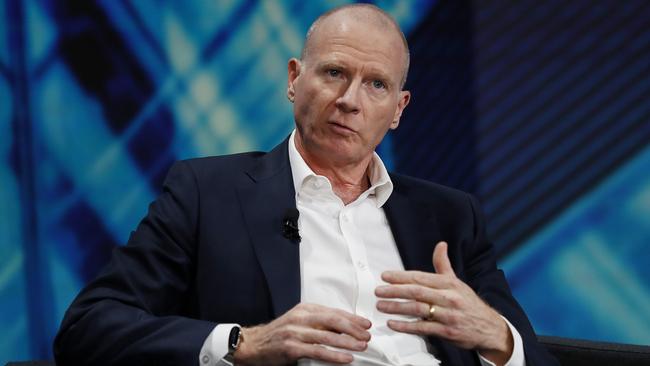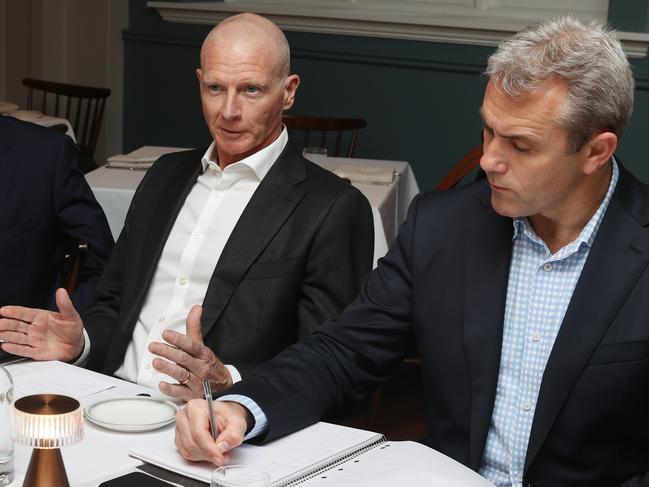Australia at fork in road on regulation, says Cochlear boss Dig Howitt: ‘US more attractive than Europe for investment’
Australia can either go down a US-style push to deregulate or continue its current European-style path of increasing regulations on business, says Cochlear CEO Dig Howitt.

Australia has a stark choice between following a US-style push to deregulation under Donald Trump, or staying on its current European-style path of increasing regulations on business, the chief executive of bionic ear company Cochlear, Dig Howitt, has warned.
Speaking at a round table on productivity hosted by The Australian and the Business Council of Australia, Mr Howitt, whose company has operations around the world, including in China and the US, said Australia had recently been following a European path of adding more regulations on the economy.
“Australia has a real choice, which is even more stark now that Donald Trump is planning a department of government efficiency with Elon Musk and (US businessman Vivek) Ramaswamy,” he said.
“In Europe, regulation has been consistently rising over the years.
“It is stifling productivity and making it more difficult to get products on to the market.
“At the same time, in the US (regulations) have been going up, but at a much lower rate. It is a much easier place to invest and employ people.
“We are seeing these two significant parts of the world going in different directions.
“Australia is at an important point to decide which way we want to go. We’ve really got a choice.”
He said Australia had been following more of the European approach recently, including adding on more regulations around labour. “I don’t think there has been any serious review of productivity of the cost of regulation and its impact – what it is costing to solve the problem,” he said.
Mr Howitt said Australia needed to take a closer look at whether there were more creative ways to solve problems than imposing more regulation and increasing levels of government spending.

Business leaders at the round table said there were many competitive options for companies around the world in where to invest, particularly for global businesses.
In the short term, Mr Howitt said, Cochlear was continuing to invest significantly in Australia and was hiring more people, expanding its factories and increasing its investment in research and development, but as a company it was also having to make long-term decisions about “where we invest over the next 50 to 80 years, where can we best operate to support our customers … the US is becoming more attractive”.
Mr Howitt said Cochlear had significant manufacturing operations in Australia but had also been adding manufacturing operations in Malaysia and China.
BP Australia president Lucy Nation said there had been a big flow of capital into the US attracted by President Joe Biden’s Inflation Reduction Act.
She said Australia now had some new competitors in the world (for investment) “which we are not using to benchmark ourselves against”.
“Oman is doing a lot to compete for foreign capital,” she said. “They don’t have some of the advantages that Australia has, but they do have very good resources in solar and wind energy.
“India is another example (of countries competing with Australia for foreign investment), as is the United Arab Emirates and Singapore.
“There are a number of countries which want to take foreign investment from Australia and are really competing to do that. We need to understand that and not be complacent.”
Ms Nation said artificial intelligence had the potential to give Australia a competitive edge in the future, but Australia ran the risk of being left behind “if we don’t collectively, as a team, look at how we transition into this space”.
“Different countries are approaching (the development of AI) differently and trying to drive it as a source of competitive advantage,” she said. “Australia has some good natural advantages, including being a good location for data centres from a national security point of view.
“It is a big national opportunity for us to go after, but there are a number of watchpoints for the investors who are making those decisions, such as access to labour, such as regulation and the timeliness of permitting approvals processes and energy policy.”
Business Council chief executive Bran Black said Australia should not overregulate AI.
He said the use of AI could “lead to an uplift in economic growth of between one and 3.5 percentage points over the next 10 years”.
“We are at this point, in terms of AI, where we don’t want to see a situation like we have seen in the EU or even in Canada, where there has been uncertainty about what it is that they (government) are trying to stop or what they are trying to capture,” he said.
“As a consequence of that, the regulation has been too broad, and investment is being driven away. We’ve got a chance to really drive AI-related investment in Australia but we have to be careful about how we go about regulating it so we don’t lose that opportunity.”






To join the conversation, please log in. Don't have an account? Register
Join the conversation, you are commenting as Logout